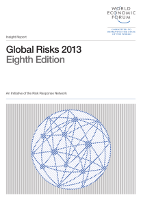|
|

Analysis of Global Risks

|
Global Risks 2013: Eighth Edition; World Economic Forum
91-93 route de la Capite, CH-1223 Cologny/Geneva, Switzerland, 80p. 11 MB.
The report lists the following greatest risks to humanity in the year 2013 by consequence as:
- Major systemic financial failure
- Water supply crises
- Chronic fiscal imbalances
- Food shortage crises
- Diffusion of weapons of mass destruction
The report lists the following greatest risks to humanity in the year 2013 by likelihood as:
- Severe income disparity
- Chronic fiscal imbalances
- Rising greenhouse gas emissions
- Water supply crises
- Mismanagement of population aging
|
These risk are for this year only.
Some ideas from the text:
"The fact remains that today’s massive socio-economic challenges demand immediate attention, yet availability of public resources is limited", page 17.
The Forum suggests country establish a: "Country Risk Officer – analogous to Chief Risk Officers in the corporate world – would be
the focal point for managing a portfolio of risk across disparate interests, setting national
prioritization of risk and allowing governments to engage in the forward action needed to
begin managing global risks rather than merely coping with them." page 41.
|
|

|
CBC Ideas podcast on Risk.
September 10, 2012.
Includes analysis of perceptions of the Japan March 11, 2011 tsunami.
Includes interviews with various experts on risk and risk management. Kevin Wallinger was interviewed on the preparedness for response to a disaster.
Your perception of risk can be manipulated. It is affected by emotion. Is our first challenge, dealing with our perception of risk?
|
|

|
Author, Annalee Newitz, in conversation about her book: "Scatter, Adapt, and Remember: How Humans Will Survive a Mass Extinction". Hosted by Ira Flatow and Science Friday.
June 07, 2013.
Ms Newitz summarizes her findings and offers that all mass extinctions are caused by climate change. The climate change can be triggered by various global events that change the content of the atmosphere such as super eruptions and collosal meteorite and asteroid impacts. She explains that, as a species, humans can survive a mass extensions because of our resilience - ability to adapt.
|
|

